Uncover the Wonders of Nevada’s Great Basin National Park
Oldest living trees, longest Nevada cave system, darkest skies in the lower 48 states—these attractions are all part of this lesser-visited park’s charm.
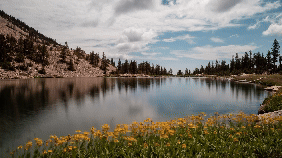 Adobe Images
Adobe Images
You may find yourself drawn to the Great Basin National Park for its excellent offerings in outdoor activities like hiking, biking or fishing; maybe you want an unbeatable look at the cosmos from a DarkSky-certified park; or perhaps you want to marvel at the intricate, fragile formations of the two-mile-long Lehman Caves, discovered by its namesake in the 1880s.
No matter how you spend your time in the park, one thing you’re not likely to see is a large crowd of visitors. With a remote location in the high desert of east-central Nevada near the Utah border, Great Basin National Park is 300 miles north of Las Vegas and off the beaten path of most travelers. It saw only 143,265 visitors in 2023, making it the tenth-least-visited national park.
The 77,000-acre Great Basin National Park is one part of the Great Basin region that stretches from California’s Sierra Nevada to the Wasatch Mountains in Utah. Elevations range from 5,000 to 13,000 feet, giving Great Basin National Park a diversity of landforms and life. It’s a place of alpine lakes and old-growth bristlecone pine forests, where mountain peaks meet hot desert valleys, and it’s even home to Nevada’s only remaining piece of permanent ice, Wheeler Peak Glacier.
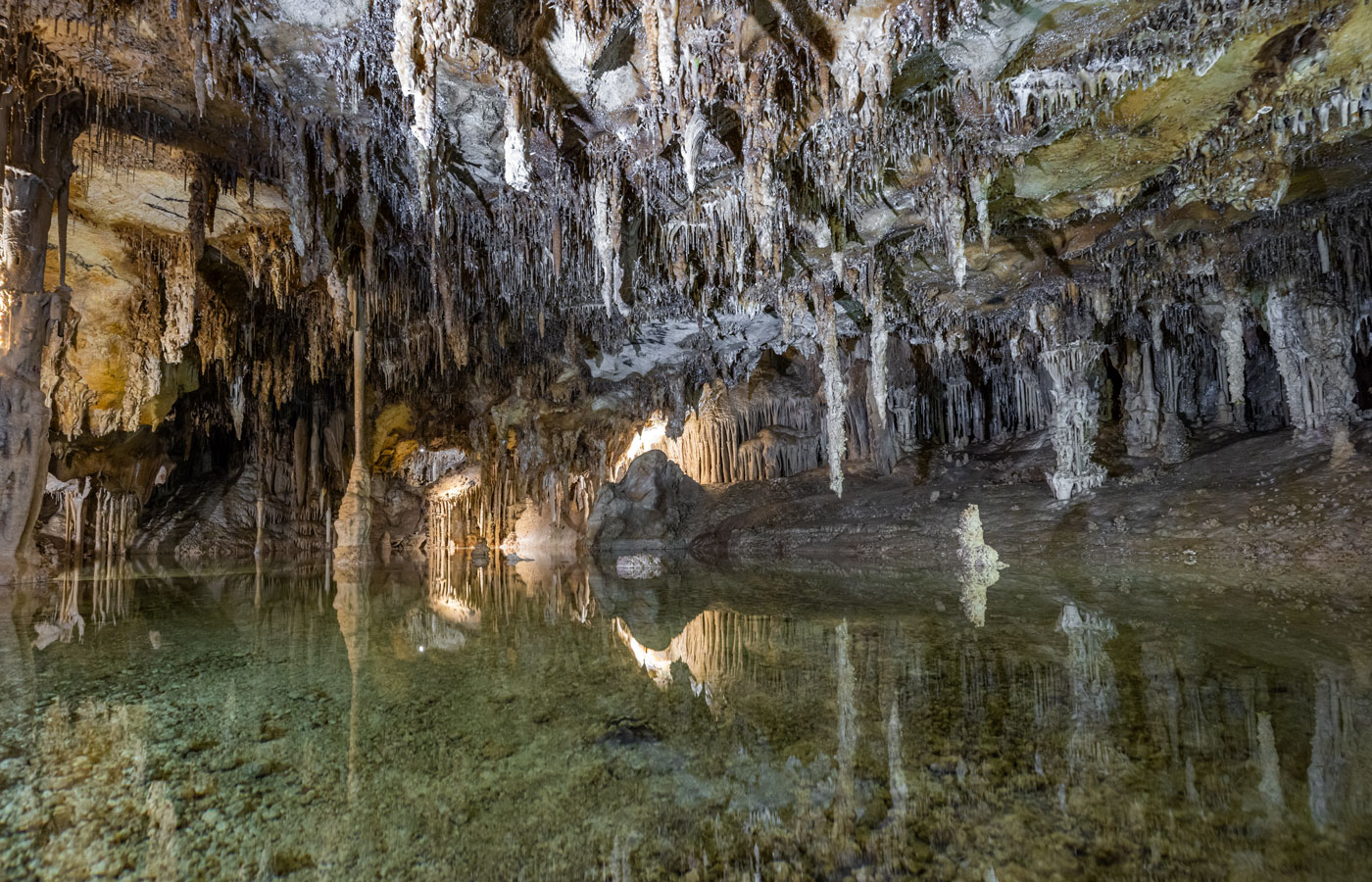 Discovered in 1885, the Leman Caves are known for their beautifully preserved array of speleothems (cave formations), including stalactites, stalagmites, and rare shield formations.
Adobe Images
Discovered in 1885, the Leman Caves are known for their beautifully preserved array of speleothems (cave formations), including stalactites, stalagmites, and rare shield formations.
Adobe Images
Basin Life
Established in 1986, the park is part of a region that has been home to American Indians for thousands of years. In more recent times, the land was used by farmers, ranchers and sheepherders.
Not long after Absalom “Ab” Lehman moved to the area in the 1860s to start a ranch, he was joined by family members. A community grew around Lehman Ranch, an orchard soon followed, and in the 1880s Lehman discovered a cave on his property that he opened for tourism. Each year, hundreds of visitors toured Lehman Caves, guided by Ab himself. Today, cave tours are still given by the National Parks System.
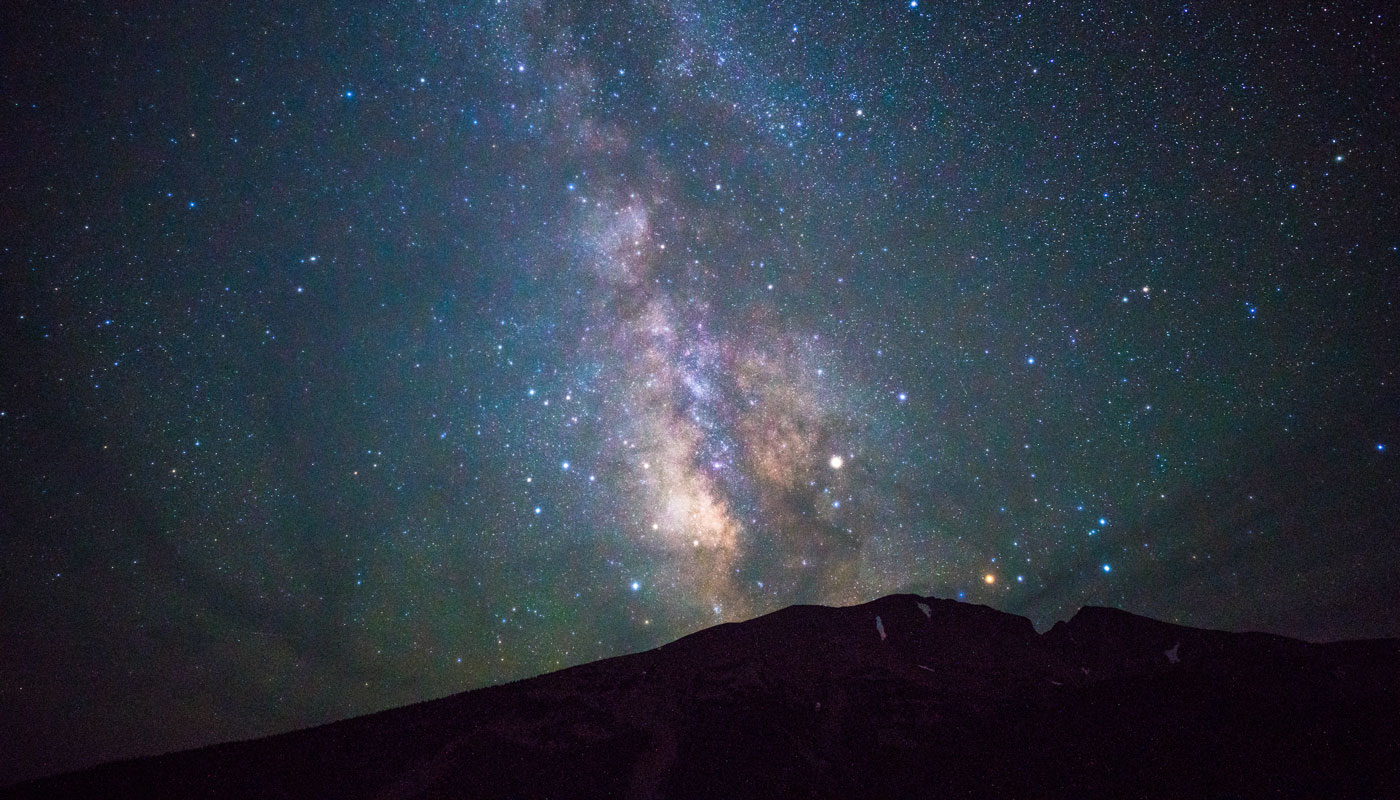 Great Basin National Park offers near-perfect conditions for viewing celestial bodies, with minimal light pollution and clear, dry air, allowing visitors to see the Milky Way, planets and countless stars in stunning detail.
Adobe Images
Great Basin National Park offers near-perfect conditions for viewing celestial bodies, with minimal light pollution and clear, dry air, allowing visitors to see the Milky Way, planets and countless stars in stunning detail.
Adobe Images
Outdoor (and Underground) Activities
Because most of your time in the park will be spent on the east side of the South Snake Range, morning and early afternoon hours (before the sun drops behind the ridge) are best for daytime pursuits. Popular Great Basin choices include exploring the alpine lakes and ancient bristlecone pine groves, hiking well-maintained trails along Wheeler Park Scenic Drive, and camping in one of the park’s five developed campgrounds. Here are additional details for a few of the park’s standout activities:
- Gaze at the stars. Thanks to the park’s high altitude and remote locale, Great Basin has some of the darkest skies in the lower 48 states. Star gazers are treated to regular sightings of the Andromeda Galaxy as well as some of Earth’s neighbors in the solar system like Jupiter, Saturn and Mars. Wheeler Peak Campground’s 10,000-foot elevation makes it a good spot to marvel at the night sky. Another option for stargazing is Astronomy Amphitheater (near Lehman Caves Visitor Center). And if you visit in early September, you’ll be able to attend the free Annual Great Basin Astronomy Festival. It’s one of Great Basin National Park’s busiest and most popular weekends—three days and nights of fun featuring plenty of stargazing as well as activities like star parties, constellation talks and astrophotography workshops.
- Tour a cave. Join the ranks of visitors who’ve been exploring Lehman Caves since 1885. A tour of the longest cave system in the state of Nevada features unique limestone caves full of stalactites, stalagmites, popcorn, cave shields and more. Moderately priced ranger-guided tours of Lehman Caves are offered year-round. Due to the tours’ popularity, tickets should be reserved ahead of your visit (especially if you’ll be visiting in summer months and/or on weekends).
- Go for a scenic drive. Wheeler Peak Scenic Drive is 13 miles of paved road that’s both winding and steep. It’s open year-round to Upper Lehman Creek Campground and features unmatched views and a chance to experience the diversity of the Great Basin. Visitors can download the NPS app and listen to the “Great Basin Life Zones” self-guided audio tour for details about the various ecosystems as they travel the road to an elevation of 10,000 feet. Check with NPS.gov for closures and up-to-date park conditions.
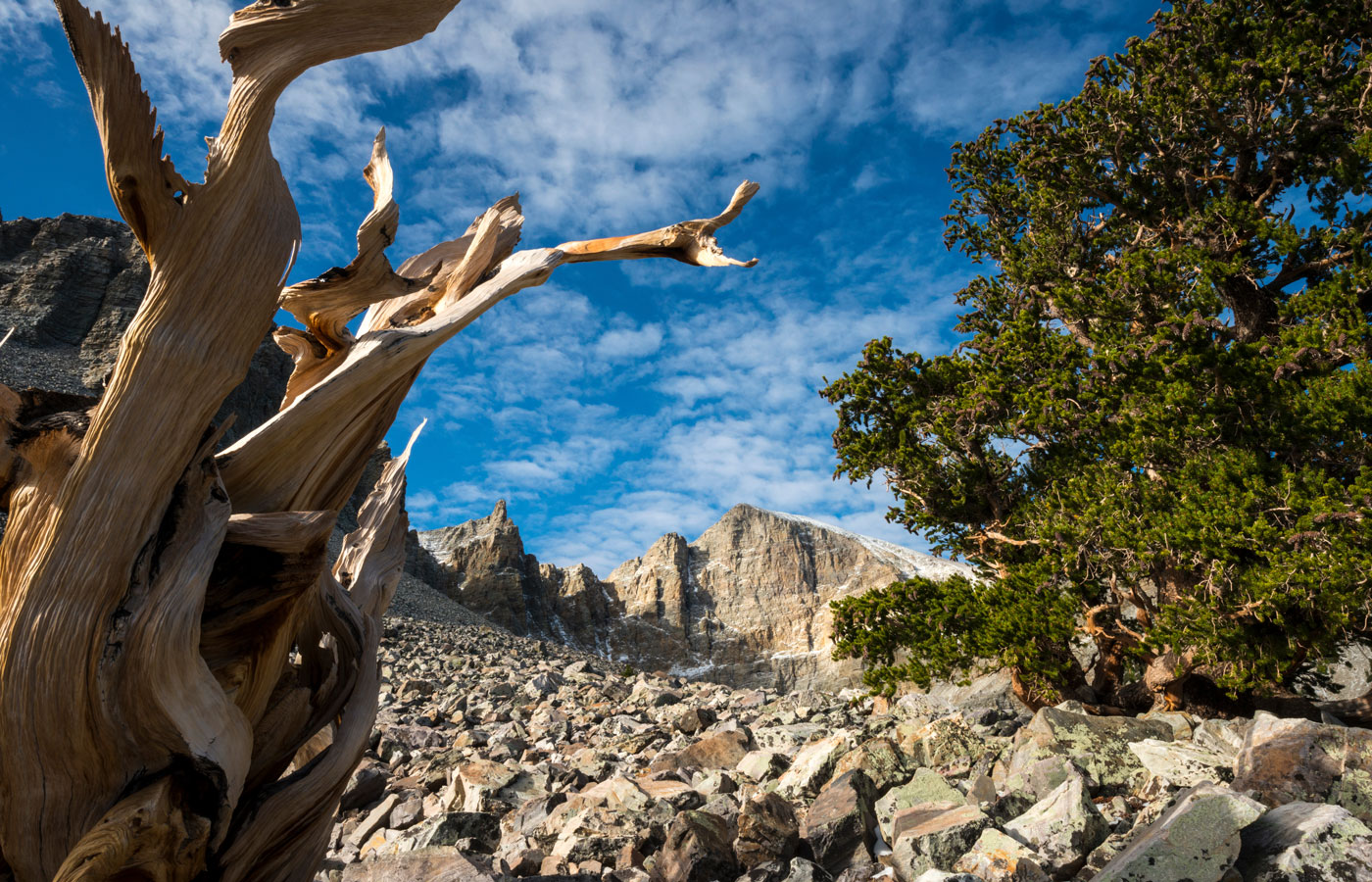 Two bristlecone pine trees, the oldest single living organisms on earth, frame Wheeler Peak in Great Basin National Park, Nevada.
Adobe Images
Two bristlecone pine trees, the oldest single living organisms on earth, frame Wheeler Peak in Great Basin National Park, Nevada.
Adobe Images
- Hike to discover ice and ancient growth. Your reward for hiking the 4.8-mile Bristlecone and Glacier Trail is a chance to see the last glacier in Nevada—Wheeler Peak Glacier. An amalgamation of rock and ice, it’s just one time-worn attraction you’ll discover on your hike. On the trail to the edge of the two-acre glacier, you’ll pass bristlecone groves that have stood for thousands of years. The trail provides a welcome break from the summer heat of the Snake Valley, but be sure to bring plenty of water and be wary of symptoms of altitude sickness.
Explore the National Parks with AAA. Whether you explore solo or with a trusted AAA Travel partner, adventure awaits.
Start Planning TodayHow to Get There
Great Basin National Park is in east-central Nevada near the Utah border. Most visitors reach the park by taking NV-488 west 5 miles from the town of Baker. Travelers should note that because the park is in an extremely remote location, they should not expect cell phone coverage, public Wi-Fi or nearby places selling gas and groceries.
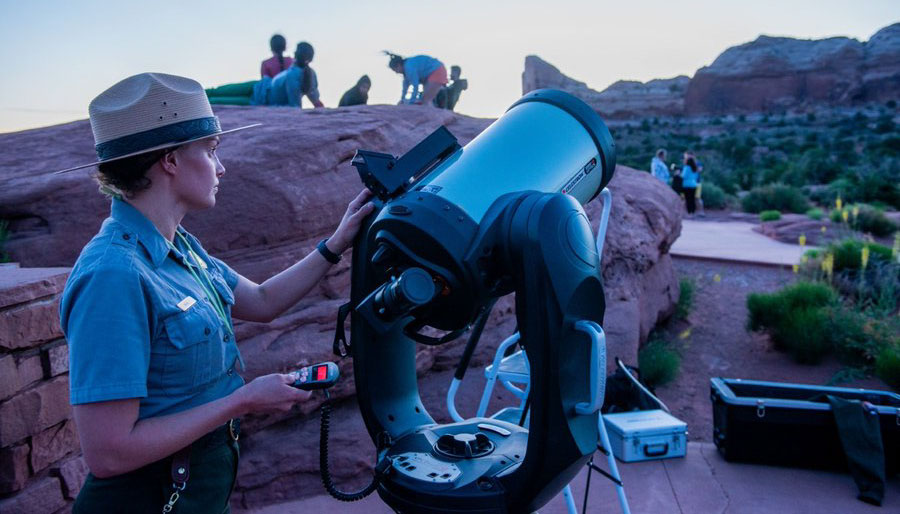 The Astronomy Festival is held in September when the skies are clearest. It includes educational workshops, telescope viewing sessions, constellation tours and guided hikes led by astronomers and park rangers.
NPS
The Astronomy Festival is held in September when the skies are clearest. It includes educational workshops, telescope viewing sessions, constellation tours and guided hikes led by astronomers and park rangers.
NPS
When to Go
This part of Nevada can be hot and dry, so the drive is most comfortable in the fall when temperatures have started to cool. Since the park rarely sees crowds outside the Astronomy Festival in September, there’s no peak season to avoid as you plan your trip. The time of year you visit will determine what you’ll be able to see and do at Great Basin. Alpine wildflowers cover the area in spring, and pine nuts are plentiful throughout the park in the fall. Winter sees a seasonal migration of mule deer through the area. Spring, summer and fall are popular times for stargazing, hiking and fishing. Skiers and snowshoers can enjoy open terrain and plenty of outdoor solitude in the winter.
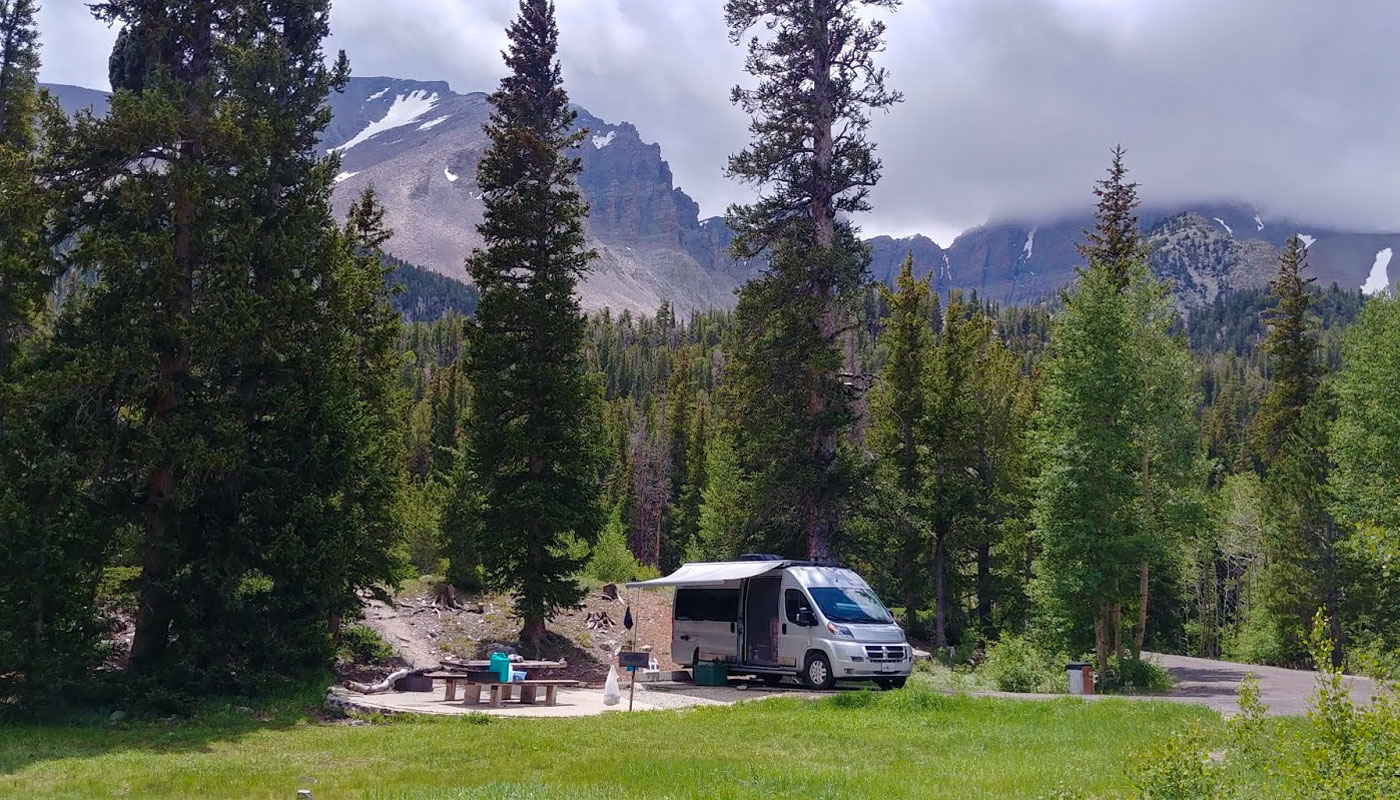 Camping at Wheeler Peak in Great Basin National Park offers a back-to-nature experience with access to hiking, wildlife viewing and breathtaking scenery.
Recreation.gov
Camping at Wheeler Peak in Great Basin National Park offers a back-to-nature experience with access to hiking, wildlife viewing and breathtaking scenery.
Recreation.gov
Where to Stay
Lodging options as well as lists of businesses providing goods and services in and around the nearby town of Baker can be found at the National Park Service website. Alternatively, the park has five campgrounds, including Wheeler Peak Campground at an elevation of 10,000 feet. Reservations must be made for nights during peak season at both Upper Lehman Creek and Wheeler Peak campgrounds.